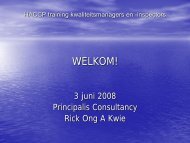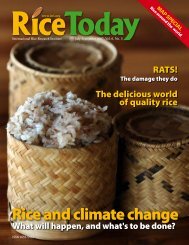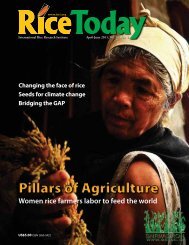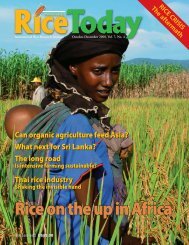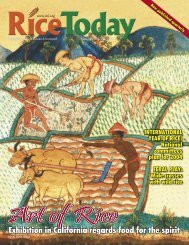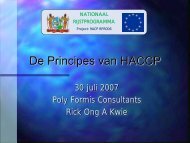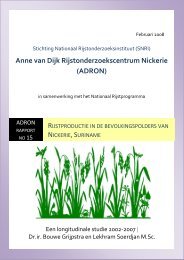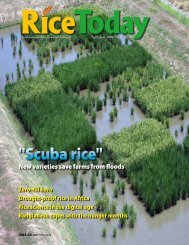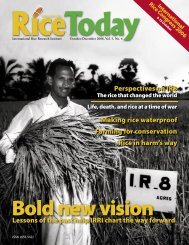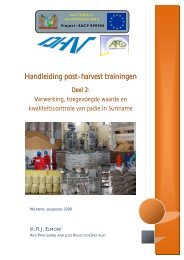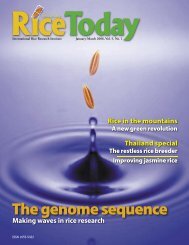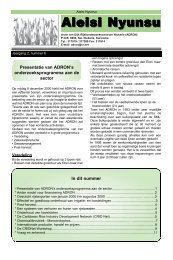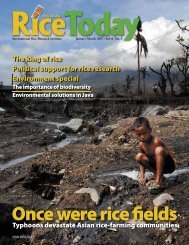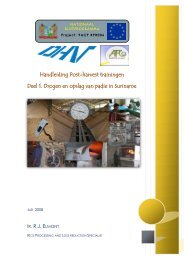How much water does rice need? - adron.sr
How much water does rice need? - adron.sr
How much water does rice need? - adron.sr
Create successful ePaper yourself
Turn your PDF publications into a flip-book with our unique Google optimized e-Paper software.
NEWS http://<strong>rice</strong>news.irri.orgLetterTo the Editor:Thank you for 4 years of Rice Today. It has been a fantastic resource forteaching undergraduate environmental health students. I have usedarticles in case studies in areas ranging from environmental healthequity and the social determinants of health, resource allocation withinand between countries, and the transfer of science research to practice.One particular article, Fear and loathing drive <strong>need</strong>less insecticide use(Rice Today Vol. 3, No. 2) gets a guernsey each year with my secondyearenvironmental chemistry students as I use it as the basis for oneof their assignments. And, of course, there are the great centerfolds.Dr. Kirstin RossLecturer, Environmental HealthDepartment of Environmental HealthSchool of MedicineFlinders UniversitySouth AustraliaRural poverty and incomedynamics in Asia andAfricaNew Bookswww.irri.org/publicationsEdited by Keijiro Otsuka,Jonna Estudillo, and YasuyukiSawada; published byRoutledge; 256 pages.Although there is <strong>much</strong>interest in poverty reduction,there are few agreed-uponstrategies to effectively reducepoverty. In this new book,the editors have gatheredtogether evidence on povertydynamics, based on data fromthe Philippines, Thailand, Bangladesh, India, and sub-SaharanAfrica. The major finding is that rural households in sub-SaharanAfrica are beginning to experience the same pattern of structuralchange in income composition and poverty reduction that Asianhouseholds have experienced over the past 25 years. The bookexplores how the spread of the Green Revolution triggered thesubsequent transformation of rural economies, including povertyreduction through the adoption of modern <strong>rice</strong> technology—and subsequent higher rates of education for children—andthe gradual diversification of income sources away from farm tononfarm activities. The editors contend that the Asian experienceprovides valuable lessons for sub-Saharan Africa. For orderinginformation, visit http://tinyurl.com/6kh62s or Amazon.com.TRAINING COURSES AT IRRIBasic experimental design and data analysisusing CropStatIRRI Training Center, Los Baños, Philippines, 2-6 February 2009The course acquaints researchers with principles of experimentaldesign (particularly for <strong>rice</strong> research), analysis of variance, andregression and correlation analysis. It also introduces CropStat, acomputer-based statistical package for experimental data analysis.For more details, contact Dr. Thomas Metz (t.metz@cgiar.org) or Dr.Noel Magor (IRRITraining@cgiar.org).Leadership Course for Asian Womenin Agriculture R&D and ExtensionIRRI Training Center, Los Baños, Philippines, 2-13 March 2009Topics include Asian women in the workplace; mainstreaming genderconcerns in the workplace; leadership and management; personalitydevelopment; developing work-related knowledge and skills; andrelating to others.For more details, contact Dr. Thelma Paris (t.paris@cgiar.org) or Dr.Noel Magor (IRRITraining@cgiar.org).Ecological management of rodents, weeds,& <strong>rice</strong> diseases—biological & social dimensionsIRRI Training Center, Los Baños, Philippines, 16-27 March 2009The themes for the course are ecologically-based pest managementwith an emphasis on rodents and weeds; applying social scienceknowledge in decision analysis of pest and disease problems; farmerparticipatory research. Presenters at the course include EmeritusProfessor Charles Krebs, Dr. Grant Singleton, Dr. David Johnson, Dr.Serge Savary, Dr. Flor Palis, and Dr. K.L. Heong.For more details, contact Dr. Grant Singleton (g.singleton@cgiar.org).Rice: research to productionIRRI Training Center, Los Baños, Philippines, 18 May-5 June 2009The course aims to create a new generation of plant scientists thatunderstand the importance of innovative plant science in addressingglobal problems. Topics include an understanding of the basicsof <strong>rice</strong> production in Asia; germplasm exchange and intellectualproperty; the research issues of IRRI and its developing partners;hands-on skills for <strong>rice</strong> breeding, molecular genetics, and genomics;structuring effective international collaboration; and workingeffectively as part of the international research community.For more details, contact Dr. Hei Leung (h.leung@cgiar.org) or Dr. NoelMagor (IRRITraining@cgiar.org).2009 Global Rice Science ScholarshipsQualified students from developing countries about to conduct theirPhD research are invited to apply for Global Rice Science Scholarshipsat IRRI. The 3-year scholarships are for PhD thesis-only research.• One scholarship supported by Pioneer Overseas Corporation forapplicants from India, Bangladesh, Vietnam, Indonesia, or thePhilippines. This scholarship will emphasize <strong>rice</strong> breeding coupledwith entomology, physiology, or biotechnology.• Three scholarships for applicants from India, Bangladesh, Nepal,or Pakistan, to conduct research as part of the Cereal SystemsInitiative for South Asia. Priority given to students whoseresearch focuses on <strong>rice</strong> breeding, soil and <strong>water</strong> management,systems agronomy and modeling, and/or plant pathology withemphasis on host plant resistance and leaf pathology.Applications close 28 February 2009For more information, please contact IRRITraining@cgiar.org or visitwww.irri.training.org. Rice Today January-March 2009



